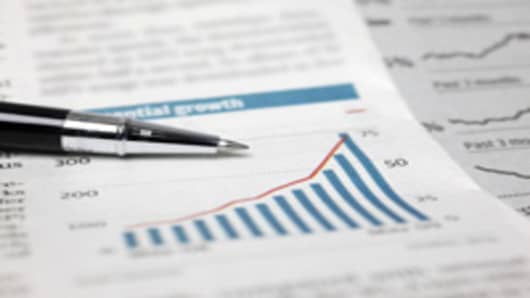Despite ongoing sovereign debt issues in the euro zone and the US, and fears of a double dip recession in the developed world, equities are undervalued and investors should consider building their exposure to them, according to Edmund Shing, head of European equity strategy at Barclays Capital.
"There is a lot of risk in the market, there is a lot of event risk in September, so it's not clear-cut that you should go out and fill your boots today, but what I would advocate is that at these valuation levels, even given the risks, one should be starting to get into the equity markets little bit by little bit," Shing told CNBC on Wednesday.
Valuations are at "multi-decade high discounts", Shing wrote in a research note earlier in August. Fund flows are returning to equity markets, macroeconomic factors could surprise to the upside and many companies with exposure to emerging markets are seeing strong earnings momentum, he said.
Shing rejected the idea that the current profitability of the corporate sector is driven by bailouts and low interest rates, which has been floated by some bearish analysts.
"With the banking sector, clearly that has been an influence," he said. "The high profit margins that we see for instance in Europe at the moment, are more a product of the intense restructuring undertaken by European corporates over the last two to three years."
"At a point today when companies are generating huge amounts of cashflow, I think the issue for a lot of companies, particularly in the non-financial sphere, is not so much how do they continue to improve margins drastically further, because the low hanging fruit has clearly been picked," he said. "The question now is what to do with that cash."
Pessimism remains the order of the day at the end of a punishing August for investors. Although August is usually a difficult month for traders, 2011's wild swings and major falls, often driven by political factors, were particularly so.
"If we look at all this as a whole, this has been a disastrous month for investors, whether it's real money investors or hedge fund investors," Shing said.
"Europe is part of the story. Clearly the seeming inability of politicians to get a handle on the crisis and to present a credible long term solution to the crisis is one part, but I also think that the sharp drop off of survey indicators at the macro level, not just in Europe, but more importantly in the US (has helped)."
"People are worried that we are going back into recession, not just in Europe, but even more in the US," he added.
The risk of a double dip recession in Europe has risen, Shing said, but BarCap does not believe it will happen "on the balance of probabilities."
Confidence and survey data has not been strong. In the US this August, consumer confidence figures fell to its lowest levels since April 2009, and both Germany and the UK saw appreciable slides.
Shing said that expectations, particularly with different noises in the market from canvassing politicians, do not reflect the reality.
"I think we should come away from the surveys, because the surveys are one thing, they are intentions, they are expectations, but as we know, people can be quite fickle," he said. "What I would say is that the real data, such as personal spending, is still rising at a nominal 5 percent plus per year. It's not great, but it's not half as bad as you'd expect looking at the confidence data."
Pessimistic coverage on the 24 hour news media is also at fault for overestimating the downside risks to investors, Shing believes.
"I think the 24-hour news media, like CNBC, are part of the issue, because they amplify the feedback loop. So, yes, things are not great. But the fact is that when you have 24-hour news channels telling people 'it's a disaster out there', after a while, they're sort of brainwashed," he said.


